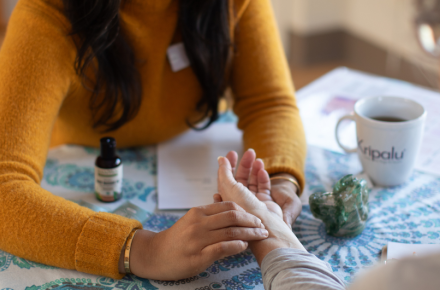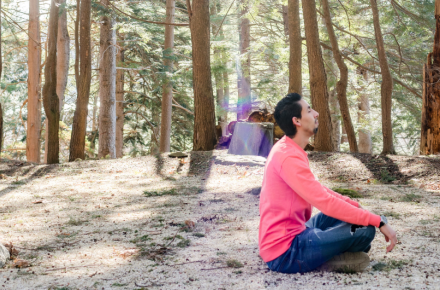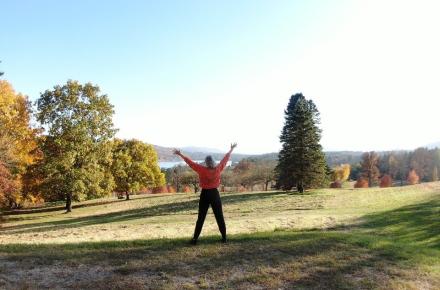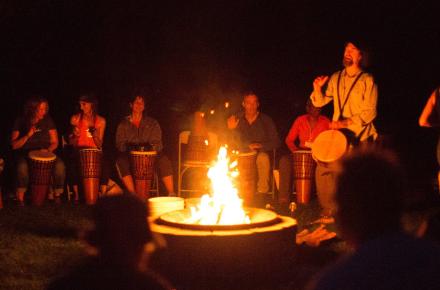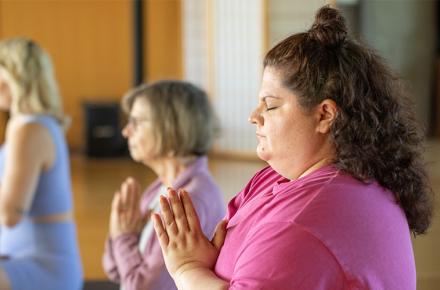Why It Took Me 10 Years to Chant Om
by Jennifer Lang
When I first began practicing yoga almost two decades ago, there was little to no chanting in class. On a rare occasion, a teacher led a call-and-response or an “om.” Class after class, year after year, I bowed out. With my eyes closed, I sat and listened.
Part of me envied my fellow practitioners’ ability to participate. But chanting in a foreign language while in a seated meditative state made me feel stiff and uncomfortable, dredging up 48-plus years of internal religious strife. “I don’t believe in it,” I would tell anyone who asked, as if chanting were belief-based. If they pushed further, I’d tell them, “I’m Jewish. Chanting prayer-like sounds in Sanskrit conflicts with reciting prayers in Hebrew.”
Growing up in northern California in the 1970s, I was inculcated to believe that chanting was synonymous with cult. At Oakland International Airport, a group of Hare Krishnas would twirl around in Baggage Claim. As children, we were instructed to steer clear of them. “They belong to a cult,” the grownups always said. “They might try to convert you.” So chanting in this same language, even years later, felt strange and wrong to me.
Then, 11 years ago, midway through my yoga teacher training, our instructor invited each of us to share our thoughts and feelings about the universal sound of om. “This eternal word is all—what was, what is, and what shall be,” one student said. Her words resonated with me. We examined one of Sri Swami Satchidananda’s interpretations of om: the origin or seed from which all other sounds and words come.
Satisfied with these non-spiritual definitions, I decided to experiment—to utter om with my classmates. Not as a leader, but as a follower, joining in unison—first once, then twice, then all three times. It was strange to hear my own voice. I’m a self-confident person, but I sounded hesitant.
Aside from om, I continued to keep my lips sealed. On a few occasions, I found myself in an Anusara class, where teacher and classmates alike joyfully chanted the opening invocation. Unfamiliar with the words and their meaning, I never dared to partake.
Until a weekend at Kripalu, where I participated in program in which we examined the invocation line by line, word by word. As 30-some people surrounding me sang, I let go and joined in. I brushed off the layers of self-consciousness and internal spiritual conflict and chanted. Surprisingly, it didn’t take me long to learn the words. It was as if they had always been on my lips and were patiently waiting until they were free to roll off.
I felt different. For the first time during centering, I felt the tension in my shoulders dissipate. For a fleeting moment, I caught a glimpse into an understanding of Patanjali’s Sutra I-2: chitta vritti nirodhah. If you can have control over your thoughts and can change them as you please, you are not bound by the outside world. Things outside neither bind nor free you; only your attitude toward them does. He made it sound so simple.
After that weekend, I chanted in yoga class on a regular basis. Once seated, I knew what awaited me—an opportunity to step outside myself, a self that analyzes the Sanskrit words and their meanings, a self that constantly considers the possible consequences of my actions. Will I be different if I start chanting? Will it mean that I’ve lost my sense of self or become one of the masses? Will it mean I am any less of a Jew?
The more I learn, the more I realize that chanting at the beginning of class is a beautiful way to create a sense of harmony and unity among practitioners. For some, it’s a way to send out thoughts and healing prayers into the world; for others, it might be an acknowledgment of the teacher within each of us. For me, it’s about community and oneness, and I welcome the opportunity with mind and body, as well as voice.
Jennifer Lang is a freelance writer and certified yoga instructor in Raanana, Israel. She blogs about living in a country she never dreamed of calling home at opentoisrael.com.
© Kripalu Center for Yoga & Health. All rights reserved. To request permission to reprint, please e-mail editor@kripalu.org.










